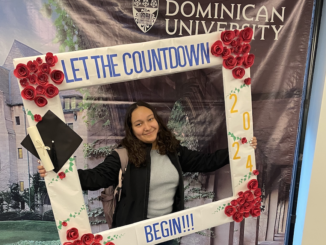
By Callah Barnes
“In the dark times / Will there also be singing? / Yes, there will also be singing. / About the dark times.”
With this quote from German playwright Bertolt Brecht, Dominican kicked off a stage reading of “The Fires,” a new play by Jennifer Rumberger that plunges the audience into a world ravaged by natural disasters where most of the United States is gone.
It explores this apocalyptic world by explaining not how humanity arrived there, but how they cope with inevitable disaster and all they have lost. In the spirit of Samuel Beckett’s Waiting for Godot, which Rumberger cited as inspiration, the play follows a dialogue between two men on an empty stage, save the pair of lawn chairs from which they watch the last of their world burn.
At Dominican’s inaugural Lit Fest, I had the opportunity not only to watch this poignant work come to life, but also to serve as a dramaturg and inform directing choices through my literary interpretation.
Working with director Cyd Blakewell, actors Joe Zarrow and Gregory Fenner from the Gift Theatre in Chicago, actress Melanie Thompson and stage manager Mateo Gutierrez from Dominican was an incredible interdisciplinary experience for me as a corporate communication major.
One of the first questions we raised during rehearsal explored the exchanges between the protagonists Meatball and Arthur. We asked which conversations are new for them and how they each discuss their situation to normalize the unthinkable. Smack talk, fantasies about sweaty wrestlers, and memories of favorite movies become their lifeline, and this palpable intimacy makes their tragedy deeply personal.
Mundane chatter evolves into raw debates about the quantity versus the quality of life and the importance of being remembered through storytelling.
We also had concerns regarding the fearmongering in the news media in regard to “The Fires.” Rumberger uses the character Reginald, who profits from the disaster by selling theatrical reports of the latest crises, to criticize media across the political spectrum that fuel paranoia by dramatizing events.
Although I do not gravitate toward dystopian literature, I became quickly invested in Arthur and Meatball’s story. The charming blend of humor, sincerity, tension, and heartbreak created a fresh, nuanced take on an apocalypse while inviting a critical reflection on sustainability.
This was the intent Rumberger revealed in the panel following the reading: to use art as a vehicle for change not by stating facts and arguments, but by developing an appreciation for our world and opening our eyes to the threat of losing it.
Daniel Pogorzelski from the Metropolitan Water Reclamation District joined the cast, crew, and other members of the Dominican community to find hope in the ability of Cook County’s five million citizens alone to make sustainable choices. Thrift shopping, regenerative meat farming, praising nature through poetry, and teaching children to recycle surfaced as options. Above all, we celebrated the power of storytelling to remind us of the beauty of the world we fight to protect.



